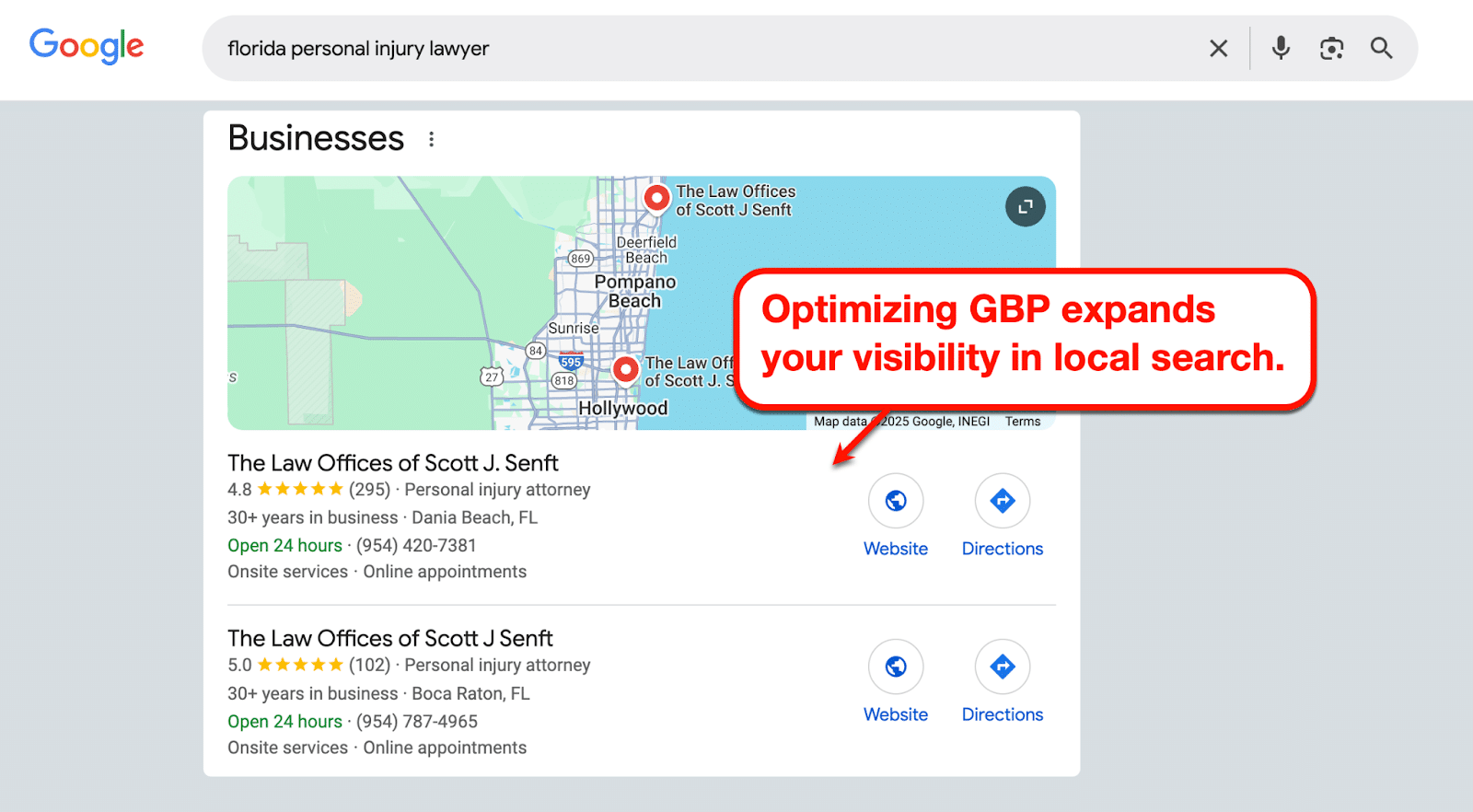Law Firm Business Development: Guide + 8 Tips
Leading a law firm to success isn’t a sprint.
It is a long, strategic marathon—separating the wheat from the chaff based on your commitment, patience, business acumen, and adaptability.
That’s why every law firm needs a detailed business development plan. This ensures that, no matter where you are now or whichever law firm marketing agency you work with, you’re positioned for massive success in the future.
In this post, we’ll cover the nitty-gritty of law firm business development.
And to give you an idea of what leads to real-world results, we also asked seven seasoned lawyers for unconventional tips that can spice up your strategy, including:
- Andy Gillin (managing partner at GJECL Accident Attorneys)
- Alex Freeburg (owner of Freeburg Law)
- Andrew Pickett (owner of Andrew Pickett Law)
- C.L. Mike Schmidt (partner at Schmidt & Clark)
- Jason Javaheri (co-founder and co-CEO of J&Y Law)
- Gordon Hirsch (founder and managing attorney at Hirsch Law Group)
- Giselle Ayala (owner of G.A.M. Law Office P.C.)
What is Law Firm Business Development?
This strategy involves cultivating business relationships and determining strategic opportunities for your law firm. It involves an elaborate, strategic approach to research, leverage, and optimize new streams of income for your firm.
Finding these opportunities means more cases from new clients to work on and improved existing client relationships, all of which improve your bottom line and grow your business.
How Does Business Development Differ From Traditional Marketing for Law Firms?
Business development for law firms is an overarching plan for ongoing growth. Traditional marketing, on the other hand, is an area of business development that focuses on helping your firm reach a wider audience and acquire more leads.
What is a Law Firm Business Plan?
A law firm business plan is a document that outlines your company objectives and the specific strategies you’ll use to achieve them. It also outlines important details about your firm, including your mission statement, service locations, legal structure, and organizational chart.
8 Business Development Tips for Lawyers
To get the ball rolling, let’s jump straight into the business development tips that successful attorneys and law firm owners use:
1. Build Roots in Your Local Community
Establishing a strong local presence is step number one for most—if not all—of the well-known law firms today.
That’s because, in the digital age, you have access to several powerful tools to connect with the local audience and get your reputation to a fast start.
Optimizing your Google Business Profile, for instance, can be done in a day. In return, you unlock a slew of benefits like:
- Increased visibility in local search results
- Discoverability in search features (i.e., Local 3-Pack) and Google Maps
- Passive generation of client reviews and ratings

Of course, you also need to get boots on the ground and become actively involved in your local community. This will have a much bigger impact on your local reputation than by focusing purely on local SEO.
Andy Gillin, managing partner at GJEL Accident Attorneys, recommends going beyond event sponsorships and being genuinely invested in local community groups:

One interesting strategy involved partnering with local community groups and organizations. Rather than simply sponsoring events, we actively participated in the planning and execution. This engaged approach fostered trust and established genuine connections with the community. For instance, collaborating with a local nonprofit on a series of safety workshops not only helped raise awareness about personal injury prevention but also positioned our firm as a trusted resource.

2. Network in The Legal Community
Aside from a thriving local presence, you should also focus on your legal network for long-term growth.
Networking with other attorneys will not only enhance your law firm’s reputation. It can also lead to profitable referral marketing partnerships that will create an ongoing stream of high-quality leads over time.
Some of the best ways to grow your legal network are:
- Participating in legal groups on Meetup
- Attending bar association events
- Getting to know attorneys in person at the courthouse
- Consider becoming a volunteer mentor on platforms like LEAP
- Joining social media groups for legal professionals
A tried-and-tested strategy is to collaborate with a local business to help get the word out on your firm. The key is to choose a business that shares a similar audience with your firm.
For your reference, J&Y Law co-founder Jason Javaheri shares the following strategy:

We partnered with yoga studios to offer wellness sessions for accident recovery support. Combining physical healing with legal guidance gave us a unique niche in personal injury. Participants appreciated the holistic approach, leading to referrals and client sign-ups. This innovative collaboration boosted visibility and expanded our network within wellness communities. It increased client intake by 15% in six months.
The yoga studio collaboration brought in over 50 clients in its first year. The wellness sessions led to deeper trust, translating into high-value personal injury cases. On average, clients from these sessions had 20% higher settlement values than others.

3. Run Legal Workshops or Pop-Up Legal Tents
Speaking of networking, you can’t forget about hosting your own events to draw a crowd. This can expand your sphere of influence as well as build your reputation as an expert source of information in your legal practice.
For example, hosting legal workshops is a popular tactic that law firms use to gain exposure, reach potential clients, as well as showcase their knowledge and expertise.
Business lawyer Giselle Ayala, owner of G.A.M. Law Office, shares her firm’s experience with this tactic:

One unconventional tactic I’ve used is an immersive workshop for startups, focusing on intellectual property (IP) and growth strategy. By encouraging businesses to engage with experiential learning rather than traditional seminars, we’ve improved client understanding of complex IP issues. Feedback shows a 40% increase in client confidence in managing their IP strategy post-workshop.

Just remember to not shy away from out-of-the-box ideas when planning workshops or experiential learning activities.
For example, Hirsch Law Group founder Gordon Hirsch used to set up “pop-up legal tents” at public events:

I had one of the most unconventional strategies I used wherein I set up pop-up legal tents at county fairs. The idea was simple: to bring legal advice to the public in a way they were already comfortable with. We had a branded tent with clear signage that said free 10-minute consultations on things like traffic violations, landlord-tenant disputes, and family law questions.
It was received positively. They lined up to have questions they might otherwise have ignored because of the cost or complexity of hiring a lawyer. We gave out easy-to-read brochures that covered their concerns and gave us contact information.

4. Relentlessly Focus on Client Service and Relationships
Nobody sells your legal services better than past clients who had a positive experience with your firm. As such, you need to go beyond providing exceptional service and actually put an effort into maintaining long-term relationships.
Here’s a quick checklist of practices you should observe to foster better connections with your clients:
- Always be available and promptly respond to requests
- Be upfront about fees and timelines
- Avoid any implication that you offer “guaranteed results”
- Actively seek, accept, and act upon feedback
These will pay dividends in the form of positive customer reviews, direct referrals, and increased engagement across touchpoints.
Remember, every law firm can cite statistics and facts to prove a point. But not everybody can show a verifiable track record of success through testimonials, case studies, and other types of social proof.

Often, law firms rely on statistics and facts to market their services, but we found that sharing real client stories had a profound impact. This involved creating short videos featuring clients discussing their journeys and how we made a difference in their lives. These stories were shared via social media and our website, humanizing the legal process and providing potential clients with a relatable narrative. Tracking engagement through analytics, we saw video viewership increase website visits by nearly 40% and inquiries by 15%.

5. Crack Referral Marketing
By now, you should already a couple of referral marketing pipelines to your firm.
Expanding your legal network and committing to exemplary client service are just the tip of the iceberg. You should also consider partnering up with businesses and professionals in relevant industries, automating referral requests, and offering incentives.
Remember, you can easily restructure a referral program for surefire returns.
C.L. Mike Schmidt, trial lawyer and partner at Schmidt & Clark, unveils how they created a referral program that benefitted them from day one:

We offered a discount on legal services to clients who referred others, but with a twist—we also asked them to write a brief testimonial or share a positive case outcome on social media. Over the past year, this led to a 25% increase in referral clients, with about 60% of those referrals turning into long-term relationships.

Need an even bigger referral network?
You can take a page out of law firm owner Andrew Pickett’s book and collaborate with professionals in other fields:

Networking with professionals outside the legal industry often leads to unexpected opportunities. Collaborating with financial advisors, real estate agents, and healthcare providers has brought referrals and mutually beneficial partnerships, expanding my client base and opening new markets.

6. Host Free Legal Clinics
A legal clinic is a specific type of program hosted by law firms and schools—providing free (or low-cost) legal consultation, document preparation, and other services.
The community gets answers to their legal questions. In exchange, the firm gets exposure, trust, and an influx of potential, high-quality leads.
Hosting a legal clinic often involves a long checklist of planning steps, including:
- Define your goals. Start with a clear purpose by determining who you want to help, what services you’ll offer, and which objectives are you aiming for.
- Decide your venue. Choose the best venue for your event in terms of accessibility, costs, and proximity with your audience.
- Get the support you need. Consult with your bar association and local leaders to get assistance with planning.
- Build a team. Confirm who will be available to run and manage your legal clinic, possibly including volunteer attorneys and law school students.
- Promote your legal clinic. Explore ways to promote your clinic, like preparing a press release and launching a promotion campaign on social media.
As for your legal clinic’s structure, feel free to borrow ideas from other lawyers who’ve already done it—like C.L. Mike Schmidt:

One tactic that worked well was hosting a series of “legal clinics” for small businesses. Instead of a formal, paid consultation, we offered free 30-minute sessions where business owners could ask questions about their legal needs, anything from employment law to intellectual property. In just six months, we saw a 40% increase in inquiries, and 15% of those consultations turned into paying clients. It was a low-cost, high-return strategy that built trust and visibility in the community.

7. Get Creative in Offering Value to Your Audience
When it comes to growing a law firm, you have a lot of legroom for creative ideas that can capture your audience’s attention.
One particularly creative example is to offer free software designed to address your prospective clients’ needs.
Alex Freeburg, owner of Freeburg Law, successfully put this into practice:

I decided to create a free expungement tool for people in my community. The idea was basically to make the process easier for people who might not have the means to hire a lawyer. We’re talking about lives here—people trying to move on from past mistakes.
When I launched the tool, I didn’t expect much and wasn’t looking at it through the lens of business development. But within a month, over 1,000 people had heard about it. That’s 1,000 potential clients who now know my name and what I stand for.

8. Focus on Digital Marketing
Finally, it’s no secret that holistic digital marketing is the key to sustainable growth for law firms.
Digital marketing for law firms involves multiple branches, including SEO, paid advertising, social media, and content marketing. By implementing a well-rounded strategy, digital marketing yields numerous benefits:
- Enable online lead generation
- Boost your law firm’s authority
- Spread brand awareness
- Establish customer trust and loyalty
While each aspect warrants its own full-length guide, there’s one particular type of digital marketing that forward-thinking firms lean toward: webinars.
Here’s how Andrew Pickett talking about the basics of successful webinars and event marketing:

I host educational webinars and workshops on legal topics relevant to my audience. These events provide valuable insights while allowing me to showcase my expertise and build trust. By sharing practical knowledge and addressing common legal concerns, I’ve positioned myself as a trusted resource and generated leads for potential clients.

How to Integrate AI Business Development Tools to Scale Your Law Firm’s Productivity
Growing a law firm requires a comprehensive software stack to streamline specific facets of your legal business—from client intake to analytics.
Incorporating AI into your tech infrastructure will give you a massive competitive advantage.
In most applications, AI supercharges your efficiency, productivity, and decision-making.
Here’s how:
1. CRM Platform
As your legal clientele grows, consider investing in a CRM solution that streamlines communication and reporting. It also serves as a centralized customer information repository, making it easier for teams to track interactions, implement personalization, and collaborate on key tasks.
AI improves the benefits of CRM tools two-fold.
HubSpot, for example, incorporates its AI companion “Breeze” to enhance client communications, generate actionable insights, and more.

Here are other CRM tools with built-in AI enhancements:
- Salesforce
- Zoho
- Pipedrive
2. Calendar
A law firm’s day-to-day can be encapsulated in a single calendar app.
It allows you to make sense of the mountain of work on your plate—identifying priorities, making adjustments, and getting things done accordingly.
Google Calendar is a popular choice for law firms of all sizes. Not only does it make scheduling and collaborative time management easier, it also supports a ton of integrations that add useful functionalities.
Reclaim AI, for example, is a powerful extension that will help you navigate time management challenges through automation. It can find the perfect time for meetings, set focus times for each team member, and generate data visualizations for performance tracking.

Bear in mind that other law firm management apps include a calendar system right out of the box. However, free solutions like Google Calendar will suffice for law firms without a considerable software budget.
3. Messaging Tool
For law firms, messaging tools can be used both internally and externally.
Slack, for instance, can be used for talking with team members as well as clients and leads. It also comes with a bunch of perks that make it a clear industry leader in the messaging space—from drag-and-drop workspaces to third-party integrations.
In terms of AI, Slack uses generative AI to help you answer questions, summarize discussions, and refine messages before they reach clients. Ths will not only help you save time, but also ensure a consistent polish to your client communications.

If you’d like to explore other options, check out these business messaging apps with AI features:
- Mei
- Zoom
- Smith.ai
4. Project Management System
Project management systems are a versatile breed of software. They can be configured for content marketing tasks, manage team productivity, track business development milestones, or a little bit of everything.
Asana is a leading platform for this software category. In addition to the user-friendly, drag-and-drop dashboard, it also uses AI to accelerate your law firm’s task management workflows.

A well-known alternative to Asana would be ClickUp, which also comes with AI tools. Its main advantage over Asana is the sheer number of third-party integrations it supports.
5. Case Management System
Case management tools share similarities with a full-blown project management system.
The only difference is, case management systems are specifically developed for law firms.
MyCase, for instance, has everything you need to move the tedious aspects of your case management forward. This includes document management, scheduling, case analytics, and workflow automation.
As far as AI goes, case management systems can take advantage of generative AI for text editing, enhancing, and summarizing. It can also automatically identify and sort tasks based on text-based information—be it from messages or internal team notes.

Other AI-powered case management solutions include:
- Clio Duo
- SmartAdvocate
- Smokeball
Set Business Development KPIs and Iterate Your Strategy
With the core elements of your growth strategy and software stack in place, it’s time for the last and perhaps the most important part of law firm business development.
Tracking law firm KPIs allow you to gauge the efficiency and performance of your law firm. It lets you evaluate how close you are to your business development goals, which strategies are driving growth, and where you need improvements.
Some of the most important KPIs you should track are:
- Client inquiries
- New client acquisitions
- Client Acquisition Cost (CAC)
- Conversion rate
- Engagement rate
- Utilization rate
- Keyword rankings
- Monthly traffic
- Average case resolution time
To track your digital marketing KPIs, a must-have tool for any law firm is Google Analytics.
Once connected to your site, Google Analytics will automatically gather, process, and visualize website traffic data. This reveals important metrics and KPIs like page views, bounce rate, and goal completion rate.

Related reading: Google Analytics for Law Firms
Other types of data like Customer Satisfaction (CSAT) score and billable hours can be tracked with a corresponding tool, like HubSpot for CRM-related data and Clio for case management.
Remember, you don’t need to worry about getting stellar numbers ASAP. What you need to do is keep tracking the numbers over time to see if they’re improving or not.
This will help you determine if your business development initiatives are working as intended. But if there’s a downward trend, dig deep for possible inadequacies before things get out of control.
Final Thoughts
Business development for law firms isn’t just about tactics to get more clients.
It also takes into account your law firm’s authority, network, client satisfaction, and operational efficiency.
The guide above should help you set a well-defined course to your law firm business’s goals.
Just remember it’s not about big wins or huge leaps—it’s about steady and consistent improvement toward the best version of your firm.
Table of Contents
Related Articles
Dominate Your Market with Digital Marketing Services That Deliver
Talk to a certified professional today, and we will design a strategy specific to your case.







